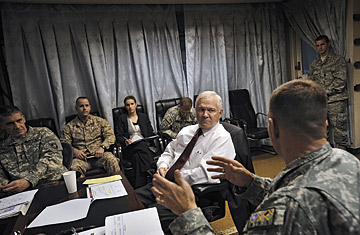
Gates being briefed at Camp Eggers in Kabul during a tour of Afghanistan last December.
(6 of 12)
The public saw only the poker face. "'Never let them see you sweat'--you can put that above Gates' door," says Richard Armitage, an old friend and colleague. Four years later, while serving as Deputy National Security Adviser under President George H.W. Bush, Gates was nominated again to be DCI. What followed was one of the longest and most bitter confirmation hearings in Senate records. CIA co-workers from the Soviet desk excoriated his character, his motives, his honesty. They called him a toady who'd fire dissenters and slant intelligence just to please his then boss, Casey. The hearings, which went on for seven weeks before Gates was finally confirmed, were even more bruising than those in 1987. They gave him perspective, Gates said, "so you don't get too pumped up about things and too down about things. One of my favorite lines is, Today a peacock, tomorrow a feather duster."
As well as being a writer, Gates is the consummate technocrat, a comforting presence who puts a face on the predictability of uncertainty. His Wichita monotone and old-fashioned speeches about service and duty exude a sense of calm and control--just what the Pentagon needed at the end of 2006 as an antidote to Rumsfeld. Gates had left government in 1992 after the elder Bush's defeat and became president of Texas A&M before being summoned back to Washington by George W. Bush. At Gates' confirmation hearings, Democratic Senator Carl Levin asked whether the U.S. was winning the war in Iraq. Gates replied, "No, sir." With those two words, he won over the Democrats in the bitterly divided Congress. (He also said he didn't think the U.S. was losing.)
In his memoir Speech-less, Matt Latimer, a speechwriter for both Rumsfeld and Bush, describes Gates as "our Winston Wolf," the Harvey Keitel character in Pulp Fiction who comes to dispose of the bodies and take care of the bloody mess after an accidental killing. "Wolf was a case study of robotic efficiency, overseeing an elaborate cleanup while calmly drinking a cup of coffee," writes Latimer. "That's what President Bush wanted--a cold-blooded competent cleaner."
The cleaner quickly went to work. He walked into the Pentagon alone. Inheriting many former Rumsfeld aides, Gates told them on his first day that he wouldn't be firing anyone. There was no time for confirmations, and he was leaving that day for Iraq. Gates brought a sense of relief, a feeling that an adult was back in charge.
Two months into his tenure, the Washington Post broke the scandal about the miserable conditions at Walter Reed Army Medical Center and the outdated, Kafkaesque bureaucracy facing wounded soldiers just to get medical attention and benefits. Gates fired the Army's secretary and surgeon general and the hospital commander. The special-ops community nicknamed him the Black Chinook--lands at night, takes care of business and gets out.
